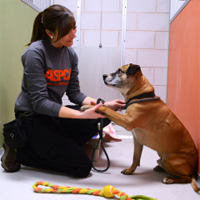Sometimes, all it takes to bring an animal out of his or her shell is a gentle pet on the head, a soft toy, a treat or a smile from a kind human.
But for dogs rescued from abusive or neglectful situations — puppy mill dogs or dogs pulled from a hoarder’s home, for example — fear is something that can be much harder to shake.
Anyone who has spent time volunteering at an animal shelter is sure to have come across at least one rescued dog struggling to overcome the intense fear he or she feels after being taken out of a terrible situation and being thrust into something new and unfamiliar. The dog may cower, shake, pee, or even show signs of fear-aggression, such as growling or biting. Behaviors like these make it hard for shelters to find homes for these terrified pets who so desperately need love.
Usually it is up to the animal shelter staff and volunteers to do what they can to help these frightened dogs overcome their fears. But the American Society for the Prevention of Cruelty to Animals (ASPCA) is hoping their new facility will be able to provide some much-needed assistance.
This week, the ASPCA announced plans to open the doors of its brand new Behavioral Rehabilitation Center at St. Hubert’s Animal Welfare Center in Madison, N.J., about 40 minutes outside of New York City. The Center, which, is part of a two-year research project funded by the ASPCA, will focus on helping the animal victims of cruelty and neglect overcome their feelings of fear so they can hopefully find a loving forever home.
The new facility includes 27 kennels, an office area, treatment rooms, and common areas, as well as a couple of “real-life” rooms meant to simulate rooms the dogs will encounter after they are adopted. A group of 10 people — including two animal behavior experts — will be on hand at the Center to work with the dogs, while volunteers will visit daily to clean kennels.
On average, the facility will work with a dog on site at the Center for about six to eight weeks, but some needing extra work and TLC will stay a little longer. Dogs who graduate from the rehabilitation program will then be transferred to an ASPCA partner shelter to be put up for adoption.
ASPCA Director of Anti-Cruelty Behavior Rehabilitation Kristen Collins calls the Behavior Rehabilitation Center groundbreaking and exciting.
“Many shelters around the country are doing great work in terms of rehabilitation and behavior modification,” Collins explains, “but often times they are stretched thin and may not have the resources to work with animals who need more time.”
“Our goal is to not only rehabilitate the dogs we admit into the program, but to also collect data for our research study so we can share these findings with other animal shelters and rescue groups. We want others to be equipped to better treat those undersocialized dogs in their care so they can save more animals.”
“It’s the first ever facility that’s dedicated strictly to providing rehabilitation for dogs that are victims of animal cruelty,” Collins tells TIME.com.
The new Behavioral Rehabilitation Center will take in its first group of dogs by the end of this week. The first dogs set to benefit from the new facility will be a group of rescued Alaskan Malamutes seized from a Montana breeding operation. The dogs had been starved and neglected, and before the breeder was convicted in December 2012 the dogs had to remain in kennels as trial evidence for 16 months. Many of the rescued Malamutes have already found good homes, but others are still in need of some extra help from the new ASPCA facility to get them acclimated to life in a normal, happy home.
St. Hubert’s President and CEO Heather Cammisa is excited to be working with the ASPCA and reaching out to dogs who really need their help. “If they are hiding in the back of the cage and they are fearful, one, they don’t have a good quality of life and, two, they are not going to be selected for adoption and when they go home, they are not really prepared to be the family pet that adopters seek,” she explained. “So this is just a win-win all-around.”
Sources: TIME.com, Reuters.com








